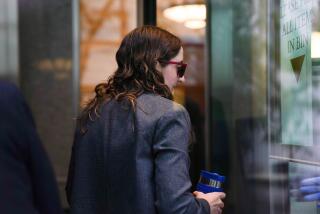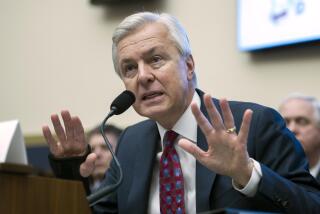Enron Trial’s First Witness Tells of Clash
- Share via
A former Enron Corp. executive’s account of a confrontation over an alleged sham sale of three barges to Merrill Lynch & Co. was never documented or reported to her superiors, she testified Wednesday.
But Amanda Colpean said she was ordered by a colleague to lie about the transaction and manipulate documents so that the sale appeared to be legitimate -- and Enron could satisfy its auditors. Colpean and 10 other Enron executives signed off on the paperwork.
Colpean was the first witness to testify in the conspiracy and fraud trial of four former Merrill executives and two former mid-level Enron executives accused of pushing through the deal in late December 1999.
Prosecutors say Enron wrongly booked a $12-million pretax profit from the deal because the energy company -- specifically, former Enron finance chief Andrew S. Fastow -- secretly promised that Merrill’s interest in the barges would be repurchased within six months. A Fastow-run partnership eventually bought that interest.
Colpean said defendant Sheila Kahanek, a former in-house accountant, yelled at her for drafting a deal that noted the buyback side deal. She said Kahanek ordered her to destroy all copies because “certain information” in it would jeopardize the deal if the document was seen by outside auditors.
Colpean, who was above Kahanek in Enron’s corporate hierarchy, said she refused to change the proposed document. But she acknowledged that she later signed a copy that “didn’t include all aspects of the deal” because it lacked language about a buyback. Colpean also said she didn’t document the confrontation or tell her superiors about it.
“I believe strongly that she would not have walked in my office acting as she did without my supervisor and her supervisor knowing what was going on,” Colpean said.
John Garrett, a member of the barge deal team, also testified Wednesday, saying that the team tried in vain to negotiate with other buyers. But they all wanted a buyback guarantee.
He said Kahanek rejected buyback promises because “if we provide a guarantee, it’s not a sale; it’s a loan.” But then Merrill emerged as a buyer, and that deal included a six-month buyout schedule.
More to Read
Inside the business of entertainment
The Wide Shot brings you news, analysis and insights on everything from streaming wars to production — and what it all means for the future.
You may occasionally receive promotional content from the Los Angeles Times.









